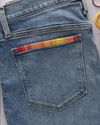Master essential sewing and dressmaking techniques with our cut-out-and-keep guides. This issue, we take you through how to work a perfect buttonhole by hand or machine.

When you’ve spent a lot of time making a piece of clothing, it’s worth paying special attention to the finishing touches. A well made buttonhole will really set off your finished project. There are various different types and styles of buttonhole which can be worked by hand or by machine – they simply require a little practice. It’s best to always make a sample first to be sure it fits properly and looks neat.
POSITIONING BUTTONHOLES
First, you need to decide in which direction to place your buttonholes. On a pattern, these will usually be marked by short lines. You don’t have to follow this and it may be better to change the direction and placement depending on the fit and style.
Buttonholes on a fabric band, such as on a blouse, or on lightweight fabrics are usually vertical as they take up less room. However, they’re more likely to come undone under strain than horizontal buttonholes.
Try your finished garment on to check the buttonhole positioning. Make sure that you have one placed exactly level with your full bust point and waist then space the others evenly apart from this point. Make sure that the button doesn’t extend over the edge of the garment when closed.
To work out the finished size of your buttonhole, measure the length of the button, add the depth to this and then add 3mm ( ⁄ in). This works for most fabrics, but you may need to add a more on heavier weights. Once you’ve worked out your positioning and spacing, mark the top and bottom of each buttonhole on the right side of your fabric then join these with a pencil line. Keep in mind that women’s clothing traditionally buttons up right over left and men’s clothing buttons up the opposite way.
BUTTONHOLE STYLES
この記事は Simply Sewing の Issue 27 版に掲載されています。
7 日間の Magzter GOLD 無料トライアルを開始して、何千もの厳選されたプレミアム ストーリー、9,000 以上の雑誌や新聞にアクセスしてください。
すでに購読者です ? サインイン
この記事は Simply Sewing の Issue 27 版に掲載されています。
7 日間の Magzter GOLD 無料トライアルを開始して、何千もの厳選されたプレミアム ストーリー、9,000 以上の雑誌や新聞にアクセスしてください。
すでに購読者です? サインイン

I AM PAN
The Pan top from I AM Patterns' Goddess collection can be sewn in wovens or knits for a comfortable and versatile basic

WHEN TWO BECOME ONE
Portia Lawrie shows us how to upcycle jumpers to make a new winter wardrobe staple

CHANGEMAKERS
There's no denying that the garment industry is doing damage to our planet, but the powerful forces behind the Zero Waste Design Collective are working hard to make a difference

STITCH upcycle
Jazz up an old pair of jeans with a stitched pocket edge! Mollie Johanson shows us how to add a subtle pop of colour to any trouser

HANDMADE TRIBUTE
Friendship, community and the memory of a good friend - Robert Sexton's favourite make is close to his heart

PATTERN REVIEW
Each month in our pattern review column, readers share their unique style with a gorgeous garment make!

TO THE RESCUE!
Children can be the star of their own action-adventure story with Kirsty Hartley's mask and cape set the perfect gift this Christmas!

THE RITA DRESS
Sew a midi- or maxi-length wrap dress to style for party season with the Rita Dress - an easy-sew design for dreamy lightweight fabrics

FRESH TAKE
Before heading off on honeymoon, Madhu Kottalam transformed an unused sari into this beautiful two-piece

MY SEWING WORLD
From her woodland cabin, Taylor runs Softpaw Vintage where she recycles vintage textiles into timeless garments